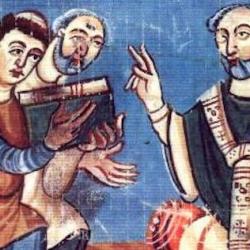Mark tells us in a parenthetical aside that Jesus purged all meats, and Peter saw a vision that taught him that he could eat anything (Acts 10-11). Still, as Allen Frantzen details in his recent Food, Eating, and Identity in Early Medieval England, Western Christians continued to observe purity rules for many centuries.
Medievals were motivated in part by “respect for Old Testament traditions. The Anglo-Saxons assumed continuity between ancient food cultures and their own. They associated querns in their own settlements with querns in biblical texts and assumed that their pots and pans were similar to those used by the Israelites. . . . For the Anglo-Saxons, cherishing Old Testament traditions was a way to confirm their identity as a Chosen People, an analogy pursued in various forms in Old English poetry and prose.”
The specific rules differed from those of Leviticus: “Handbooks of penance monitor food purity not by explaining an animal’s place in a system of classification but by warning that something about an animal’s condition prior to being consumed – the manner of death in particular – made it unfit for consumption.”
Instead of Leviticus, the penitential texts often drew from the list of prohibitions drawn up by the Jerusalem Council (Acts 15). One penitential book deals with eight canons covering food purity: “Penances are attached only to three canons: for drinking blood or semen, a penance of three years; for eating flesh torn by beasts, a penance of forty days (except in case of ‘the necessity of hunger’); and for knowingly eating ‘any unclean thing,’ penance ‘according to the degree of the pollution.’ The sinner’s account would suffice for the first two matters, but a food officer might be required to determine the ‘degree of pollution.’” Animals and birds captured in nets could not be eaten if they were suffocated, an application of the prohibition of eating strangled things.
Distinctions were made. Involuntary ingestion of unclean food was harmless. There was no offense for touching food with unwashed hands, or in eating unclean meat out of necessity. If polluted water was blessed, it was clean, and blood eaten with saliva was also licit. And there were variations among the penitential books. Another imposed a seven-year penance for drinking human blood or urine, and a five-day penance for “drinking liquid a cat has contaminated,” but one authority claimed that drinking feline-contaminated liquids was indifferent.















